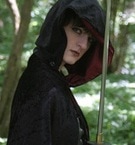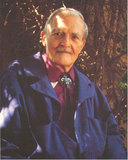The Power of Storytelling
What are stories really? Just means of entertainment? Or perhaps more...
|
When I was a young girl, growing up in Budapest, I heard a conversation between my mother and one of her well-versed friends. They talked about all the horrible things in Hungarian fairy tales, which are read to small children. These tales contain seven-headed, fire-spitting dragons, heroes who feed the eagle they are flying on from the flesh of their own thighs, gnomes who cook a couldron of soup on the bare stomach of humans...
|
|
Superficial logic would say, hearing such things should traumatise a child, but it doesn't. Somehow, none of the children listening to such things become really afraid. As my mother and her friend pointed out, these are Hungarian stories, told to Hungarian children: they are expressions of a nation's or a tribe's collective psyche, they resonate deep within the child's soul. In fact, this whole idea resonated so deeply within me that my fascination about fairy tales as expressions of the psyche never left. To present day, it is still growing stronger.
|
Later, through my studies in anthropology, I realized that indigenous people never look at stories as a form of mere entertainment (as people in our culture tend to do). Rather, they look at them as genuine reports of events - which do not occur in the physical world, but within the psyche, the invisible world of ideas. Native American shamans travel into the invisible realm to bring back lost soul parts (psychologically we would say: to reintegrate dissociated parts of the traumatized psyche), and indigenous youngsters go off into the wilderness to find a vision which shows theit lives' authentic paths. Throughout the world, stories have traditionally been used for healing and for personal growth.
Psychology has reinvented this traditional use of story-telling. The famous Swiss psychiatrist and his followers have found that fairy tales which work with the same archetypes as our personal dreams, actually contain deep messages about how to go through the adventure of life itself. In the Jungian interpretation of fairy tales, the hero (the main character) is the one the listener is identifying with, all the other characters are archetypes. They signify different parts of the psyche. The story itself presents the drama which is playing out within us.
When I wrote "Anima Mundi," I did a bit of research about contemporary children's book. I went to the library and read through dozen of them. What I found was rather shocking: it seems that contemporary authors often do not understand that within fairy tales there is a sophisticated symbolic system hidden, with tells children valuable lessons about life. In modern fantasy and strong-telling for children, these symbols end up being used arbitrarily. The symbolic message carried within the story is thus tempered with and often spoiled. As a result, children end up listening to the wrong message: for example, to give up on their dreams or failing to protect core values. This, of course, is unintentional, but nevertheless, it acts (negatively) on the subconscious.
When I wrote "Anima Mundi," I did a bit of research about contemporary children's book. I went to the library and read through dozen of them. What I found was rather shocking: it seems that contemporary authors often do not understand that within fairy tales there is a sophisticated symbolic system hidden, with tells children valuable lessons about life. In modern fantasy and strong-telling for children, these symbols end up being used arbitrarily. The symbolic message carried within the story is thus tempered with and often spoiled. As a result, children end up listening to the wrong message: for example, to give up on their dreams or failing to protect core values. This, of course, is unintentional, but nevertheless, it acts (negatively) on the subconscious.
"Trust your unconscious, |
Milton Erickson, the legendary father of modern hypnotherapy has emphasized how important it is that we listen to and tell ourselves the right stories. He frequently came up with metaphoric stories to help shift his client's perspective. When we are telling ourselves a negative story about our lives (e.g. saying to ourselves that we can't do certain things, for instance speaking in public), we can reframe the problem as a challenge and find stories which empower us to make the change. (For example: Demosthenes, the great orator of ancient Athens, took up his studies about rhetoric because he had a stammer.)
As a writer as well as a therapist, I understand stories as expressions of the unconscious mind, messages from our inner, invisible world. Thus storytelling is not some form of escapism, but a creative endeavor to find meaning in our lives and empower ourselves to walk the highest paths. The richer our stories, the richer our lives become. |


